Books About Julius Caesar: Unraveling the Life of Rome’s Greatest Leader
Disclaimer: When you buy from links on our site, we may receive a commission at no additional cost to you. Learn more
Exploring Julius Caesar’s Legacy
Julius Caesar stands as a crucial historical figure, capturing the interest of scholars, historians, and general readers. Numerous books unravel the life and achievements of this mysterious Roman general, statesman, and author. These writings delve into various facets of Caesar’s life, from his ascent to power and military exploits to his profound influence on the Roman Republic and subsequent Roman Empire.

Caesar’s Tale: Power, Passion, and Intrigue
Caesar’s narrative unfolds as a compelling saga of power struggles, passion, and intrigue, captivating the imaginations of countless individuals across history. Those eager to delve into the intricacies of this pivotal figure’s life can explore a rich trove of information within books that scrutinize his early years, military conquests, consolidation of power, cultural and historical influence, and the aftermath of his dramatic assassination.
Key Takeaways
- A variety of books explore Julius Caesar’s life, his influence on the Roman Republic and Empire, and his enduring legacy
- Many works delve into Caesar’s military campaigns, political maneuvering, and impact on Roman governance
- Readers will also find books that discuss his representation in arts, key battles and wars, and address frequently asked questions about his life and accomplishments
Early Life and Rise to Power
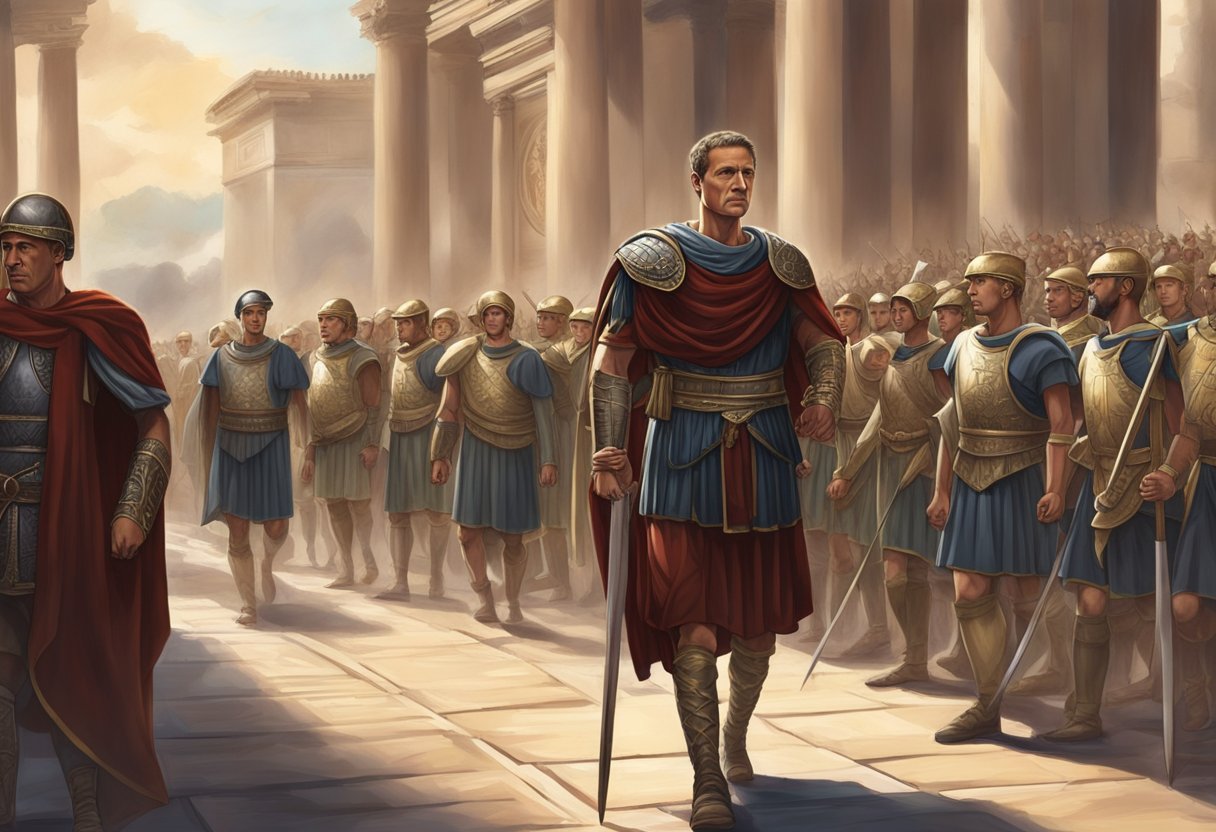
Early Political Career
Julius Caesar was born on July 12, 100 BCE, in Rome, Italy. From a young age, Caesar was involved in Roman politics. He began his career as a quaestor in 68 BCE and then became aedile in 65 BCE. In 62 BCE, he was elected praetor, a significant milestone in his political career. Caesar was popular among the people of Rome and had connections to the old supporters of Marius, which helped him navigate the political landscape of the time.
Gallic Wars
In 58 BCE, Caesar began his most notable military campaign, the Gallic Wars, which lasted until 50 BCE. During these battles, he conquered vast territories in Gaul (modern-day France and Belgium) and made significant expansions to the Roman Empire. Julius Caesar’s successful campaigns in Gaul increased his power, wealth, and popularity among the Roman people.
First Triumvirate
By 59 BCE, Caesar had become one of Rome’s most influential figures, but he encountered opposition from other powerful Romans like Gnaeus Pompeius Magnus (Pompey) and Marcus Licinius Crassus. To address this issue and consolidate their power, Caesar, Pompey, and Crassus formed the First Triumvirate, a informal political alliance. The First Triumvirate allowed Caesar to continue his conquests and fuel his rise to power.
Throughout his early life and rise to power, Julius Caesar skillfully navigated the Roman political landscape, building a legacy that still resonates today. His military campaigns and political alliances played a crucial role in Rome’s expansion and shaped the course of history.
Caesar’s Military Campaigns
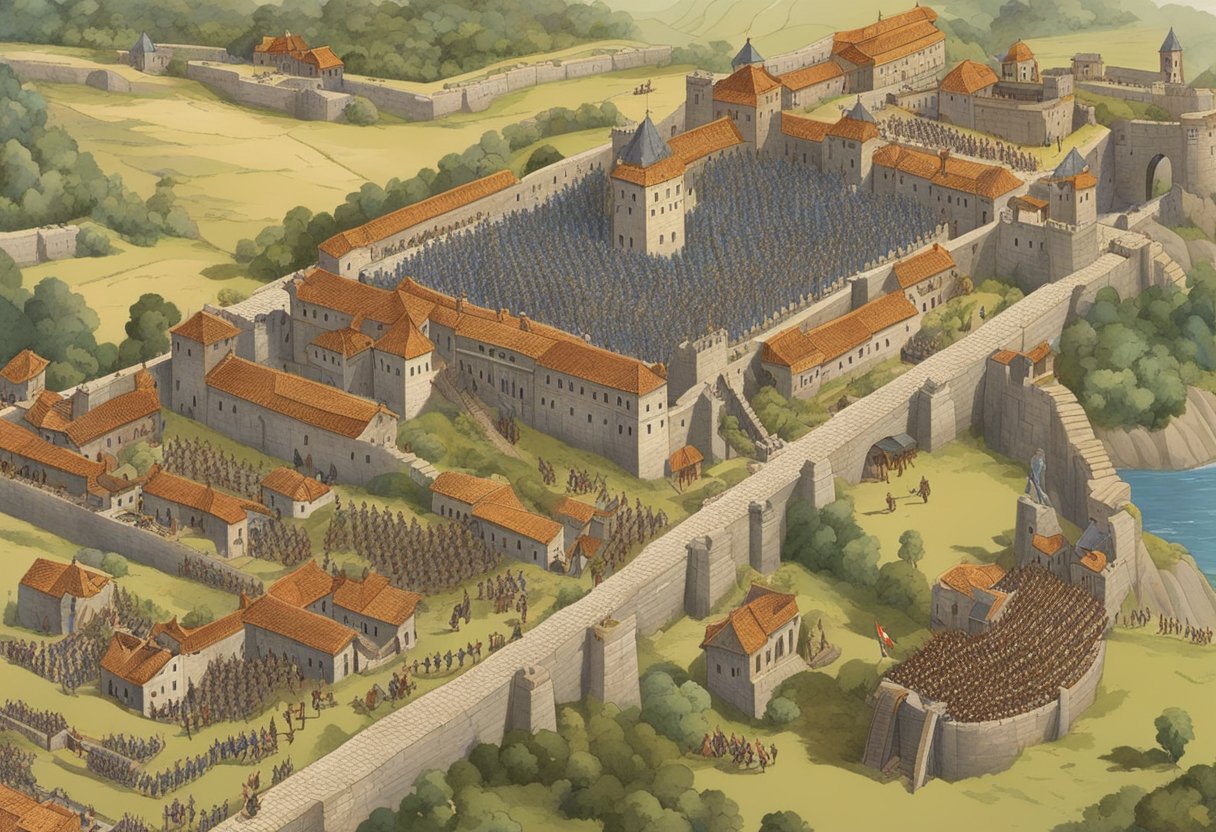
Conquest of Gaul
Julius Caesar’s military campaigns started with the Gallic Wars (58 BC-51 BC), where he led Roman forces in a series of battles against various Gallic tribes. This conquest expanded Rome’s territories significantly and increased Caesar’s power and reputation. Some key events during the Gallic Wars include:
- Battle of Bibracte (58 BC): This decisive battle resulted in a Roman victory against the Helvetii and solidified Caesar’s reputation as a skilled military commander.
- Invasion of Britain (55 BC and 54 BC): While these invasions did not result in major territorial gains, they demonstrated Rome’s military reach and prowess.
- Battle of Alesia (52 BC): This climactic battle saw the Romans besieging the Gallic stronghold and ultimately securing a complete victory, leading to the surrender of the tribe’s leader, Vercingetorix.
The Civil War Begins
As Caesar’s power grew, so did his ambition. Before long, he found himself entwined in a Roman civil war (49 BC-45 BC). This conflict pitted Caesar against other leading Roman politicians and generals, such as Pompey the Great, who commanded the support of the majority of the Senate. The civil war featured several notable battles, including:
- Battle of Pharsalus (48 BC): Caesar’s forces decisively defeated Pompey’s larger army, forcing him to flee to Egypt where he was eventually killed.
- Battle of Thapsus (46 BC): Caesar emerged victorious against the army of Metellus Scipio and Cato the Younger, leading to the surrender and subsequent suicide of Cato.
Crossing the Rubicon
The pivotal event that marked the beginning of the Roman civil war was Caesar’s fateful decision to cross the Rubicon in 49 BC. Crossing the river meant that Caesar was directly challenging the authority of the Senate, as he brought his army into Italy without the Senate’s permission. This bold move signified Caesar’s determination to assert his power and authority, demonstrating his resolve as a military and political force.
In summary, Caesar’s military campaigns showcased his strategic genius and exceptional leadership skills. From the conquest of Gaul to the Roman civil war, his victories cemented his place in history as one of the most formidable military commanders of all time.
Consolidation of Power

Dictatorship
Julius Caesar’s rise to power began as he displayed his military prowess during campaigns like the Gallic Wars. As Caesar’s influence and popularity grew, many in Rome started viewing him as a threat, resulting in his ultimate conflict with Pompey. The victory in the civil war against Pompey marked the beginning of Caesar’s dictatorship. He became a powerful figure in the Roman Republic, often challenging the authority of the Senate.
Reforms in Rome
Caesar’s reign saw several crucial reforms that reshaped Rome’s social and political landscape. He enacted land reforms to distribute land among the poor and veterans. Caesar also restructured the tax system, making it more equitable for provinces. Moreover, he implemented an ambitious construction program, building new infrastructure, and beautifying the city.
In the realm of political reforms, Caesar increased the size of the Senate and allowed more people from the provinces to be senators. This decision impacted the Senate’s composition, further centralizing authority around him.
Centralizing Authority
Caesar’s centralization of power in Rome led to both positive and negative consequences. On the one hand, it resulted in a more efficient and streamlined administration that could address Rome’s ongoing issues. On the other hand, it gave rise to concerns about tyranny and the erosion of the traditional Roman Republic values.
As Caesar continued to consolidate his authority, the Roman Senate’s influence diminished. The balance of power shifted from the Senate to Caesar, thereby eliminating the Republic’s significant aspect – shared governance. Eventually, this centralization of power contributed to Julius Caesar’s assassination, as his opponents saw it as the only way to restore the Roman Republic’s ideals.
Cultural and Historical Impact
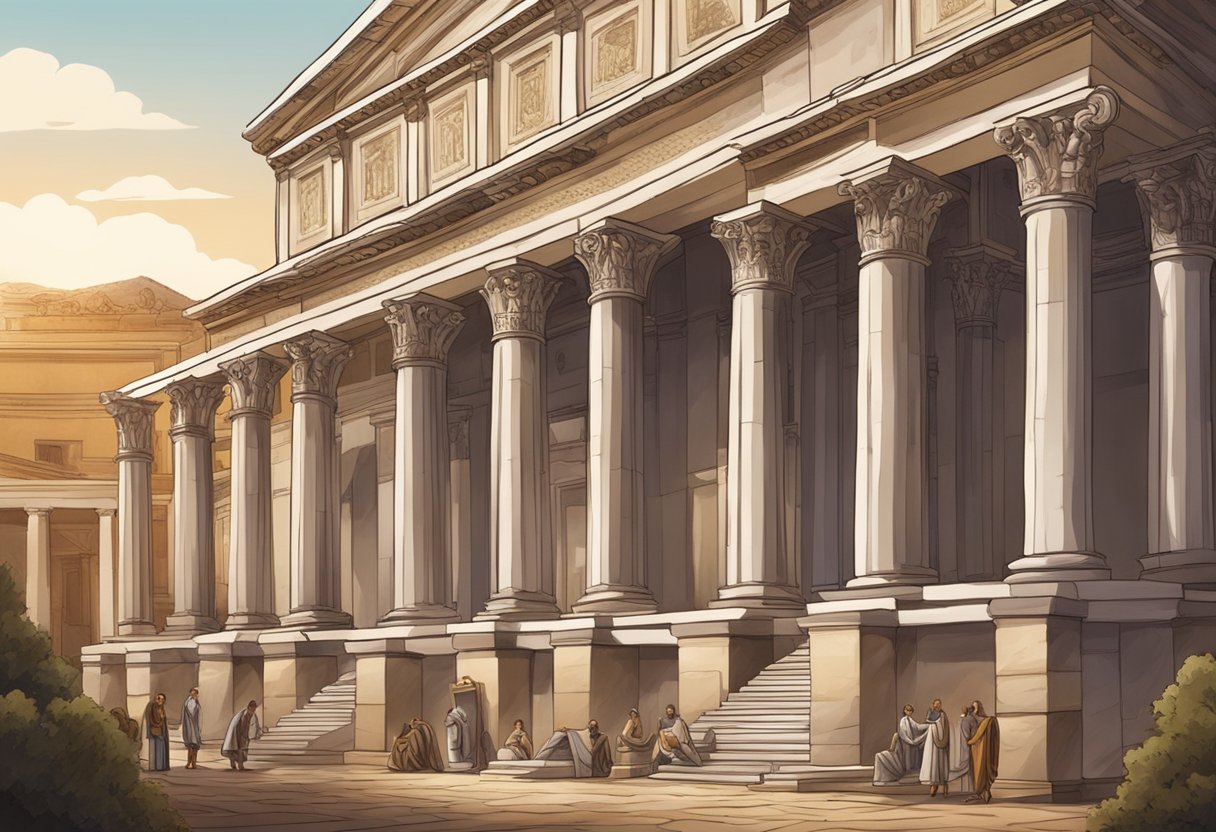
Literature and Drama
One of the most famous portrayals of Julius Caesar can be found in William Shakespeare’s play, aptly titled “Julius Caesar.” This classic work of literature delves into the political turmoil surrounding the assassination of Caesar and the subsequent fallout. While Shakespeare took some liberties with the historical facts, the play remains an important work that has shaped modern perceptions of Roman history and Caesar himself. The play’s themes, such as ambition, power, and deception, continue to resonate with audiences today and provide a glimpse into the complexities of Roman society.
Apart from Shakespeare’s play, Julius Caesar has also been the subject of numerous books and literary works. Historians and authors have examined different aspects of Caesar’s life, including his military campaigns, political strategies, and impact on Roman society. For example, Tom Holland’s “Rubicon: The Last Years of the Roman Republic” provides a vivid account of Rome as it transitioned from a republic to an empire, focusing on the crucial role played by Julius Caesar.
Julius Caesar in Modern History
The figure of Julius Caesar continues to exert a significant impact on modern history. Throughout the centuries, various leaders have sought to draw parallels between their rule and that of Caesar. For instance, Napoleon Bonaparte saw himself as a modern Caesar, modeling his empire on the Roman example. More recently, Benito Mussolini sought a Caesarian mandate for his fascist regime in Italy, believing that he could restore Italy to its former glory by emulating the Roman dictator.
Aside from politics, the name and image of Julius Caesar have been appropriated for various cultural purposes. Caesar’s Palace, a famous hotel and casino in Las Vegas, is an example of the commercial use of Caesar’s image in modern times. Additionally, Caesar has appeared in various comic books and movies, such as Asterix, which uses the Roman dictator for satirical purposes.
In conclusion, the historical and cultural impact of Julius Caesar remains significant today, as his story continues to inspire literature, drama, and political thought. While ancient Rome is long gone, Caesar’s influence on the modern world stands as a testament to his enduring legacy.
The Assassination of Julius Caesar
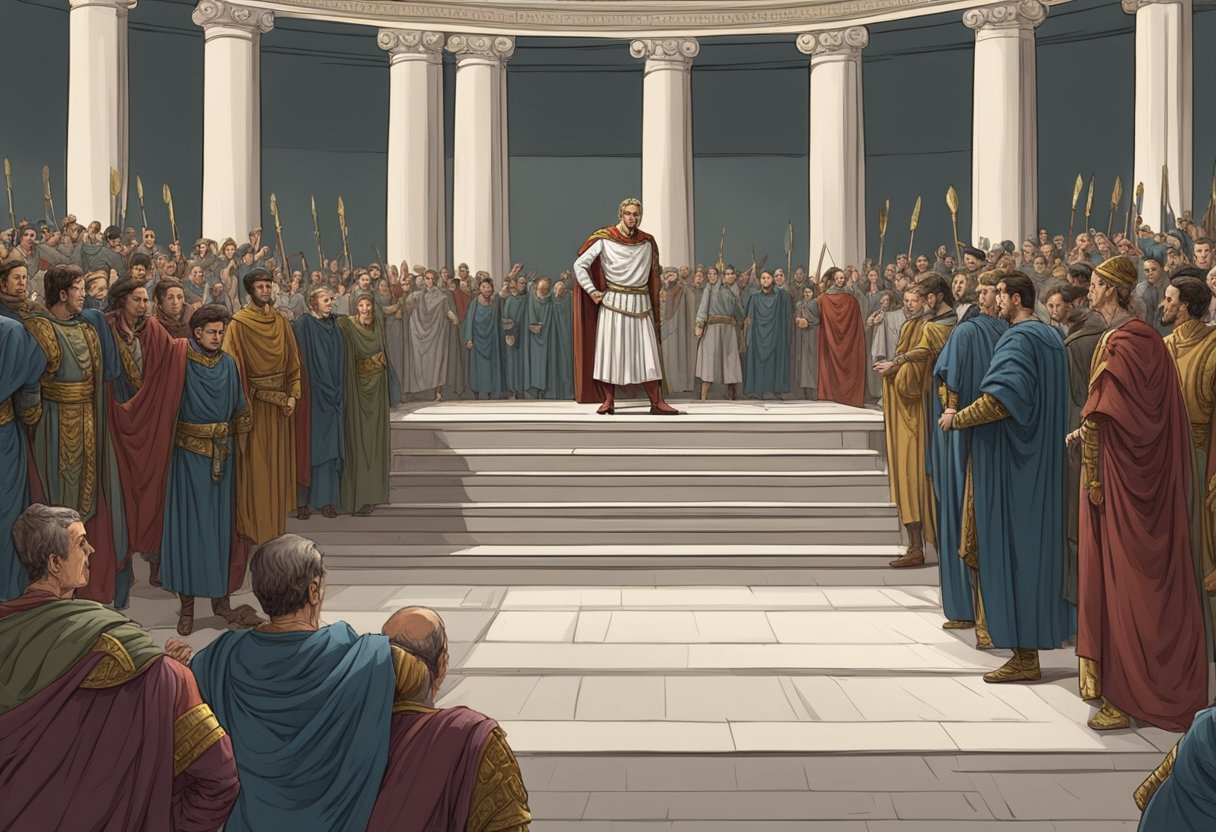
The Conspiracy
The assassination of Julius Caesar was a carefully plotted conspiracy by a group of Roman Senators who were concerned about Caesar’s growing power. Led by Brutus and Cassius, these conspirators were determined to prevent Caesar from establishing a monarchy, which they believed would ruin the Republic. They managed to recruit several other senators to join their cause, forming a secret group that would execute their plan.
The Ides of March
On the Ides of March (March 15th) in 44 BCE, the conspirators put their plan into action. Julius Caesar attended a meeting of the Senate at the Theatre of Pompey, where he was ambushed by the group of senators. They surrounded Caesar and began stabbing him, with each conspirator delivering their own blow. Caesar, shocked by the betrayal from his close friend Brutus, uttered his famous last words, “Et tu, Brute?” (And you, Brutus?). Ultimately, Caesar was stabbed 23 times, leading to his death.
Aftermath and Legacy
The assassination of Caesar had far-reaching consequences. The Roman Republic was plunged into chaos, with factions forming around various political figures, ultimately leading to a series of civil wars. This unrest paved the way for the rise of Augustus Caesar, Julius Caesar’s adoptive son, who eventually established the Roman Empire.
In the years that followed, Caesar’s assassination became a symbol of betrayal and the struggle for power. It is still studied today as a pivotal moment in history, with many books and adaptations, such as The Assassination of Julius Caesar: A People’s History and Julius Caesar – Entire Play, providing different perspectives on the events surrounding Caesar’s death and its effects on the Roman world.
Julius Caesar’s Political Maneuvering
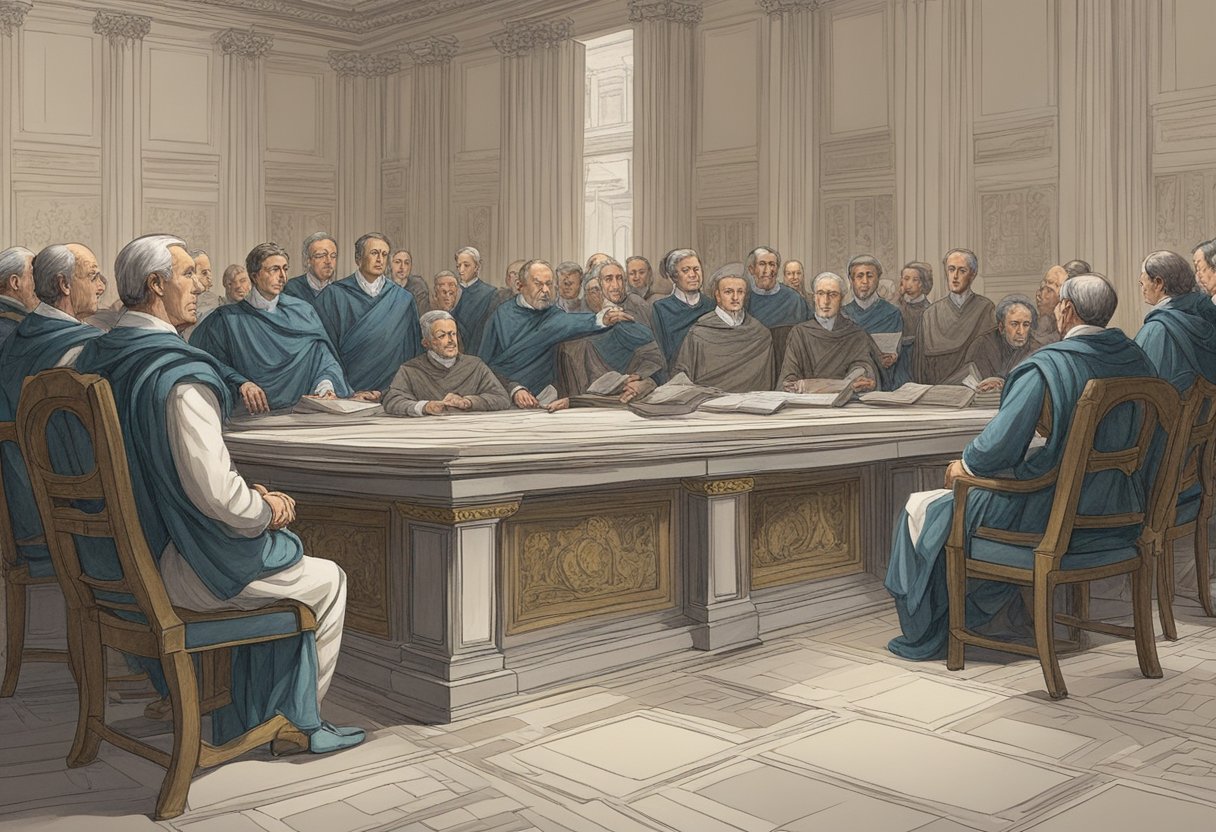
Alliances and Rivalries
Julius Caesar’s rise to power in Roman politics was marked by strategic alliances and calculated rivalries. One of his most significant alliances was the formation of the First Triumvirate with Pompey Magnus and Marcus Licinius Crassus. This political alliance allowed the three men to dominate the Roman Republic and advance their individual interests. Caesar’s relationship with Pompey grew tense over time, eventually leading to a civil war between their respective factions.
In addition to his alliances, Caesar was also known to create rivalries as a means of advancing his political goals. He often targeted the conservative members of the Senate, who opposed his ambitious reform proposals.
Reform of the Republic
Julius Caesar played a significant role in the transformation of the Roman Republic into the Roman Empire. As a proponent of reform, Caesar pushed for policies that would address social and political inequalities within the Republic. Some of his most notable reforms include:
- Land distribution to the poor
- Restructuring of the Roman calendar
- Revamping the Roman tax system
These reforms were met with resistance by the Senate’s conservative members, who saw Caesar’s actions as a threat to their power and the established order.
Conflict with the Senate
Caesar’s growing power and ambitious reforms inevitably led to tension between him and the Senate. The Senate perceived Caesar as a potential dictator, threatening the democratic foundations of the Republic. This tension culminated in the Senate declaring Julius Caesar an enemy of the state and initiating a civil war between Caesar’s forces and the supporters of the Senate, which ended with Caesar’s victory and the eventual dismantling of the Roman Republic.
In summary, Julius Caesar’s political maneuvering, driven by strategic alliances, calculated rivalries, and ambitious reforms, played a crucial role in the transformation of the Roman Republic into the Roman Empire. His actions set the stage for a new era in Roman history, characterized by the rise of powerful emperors and the decline of the once-prominent Senate.
Representation in Arts
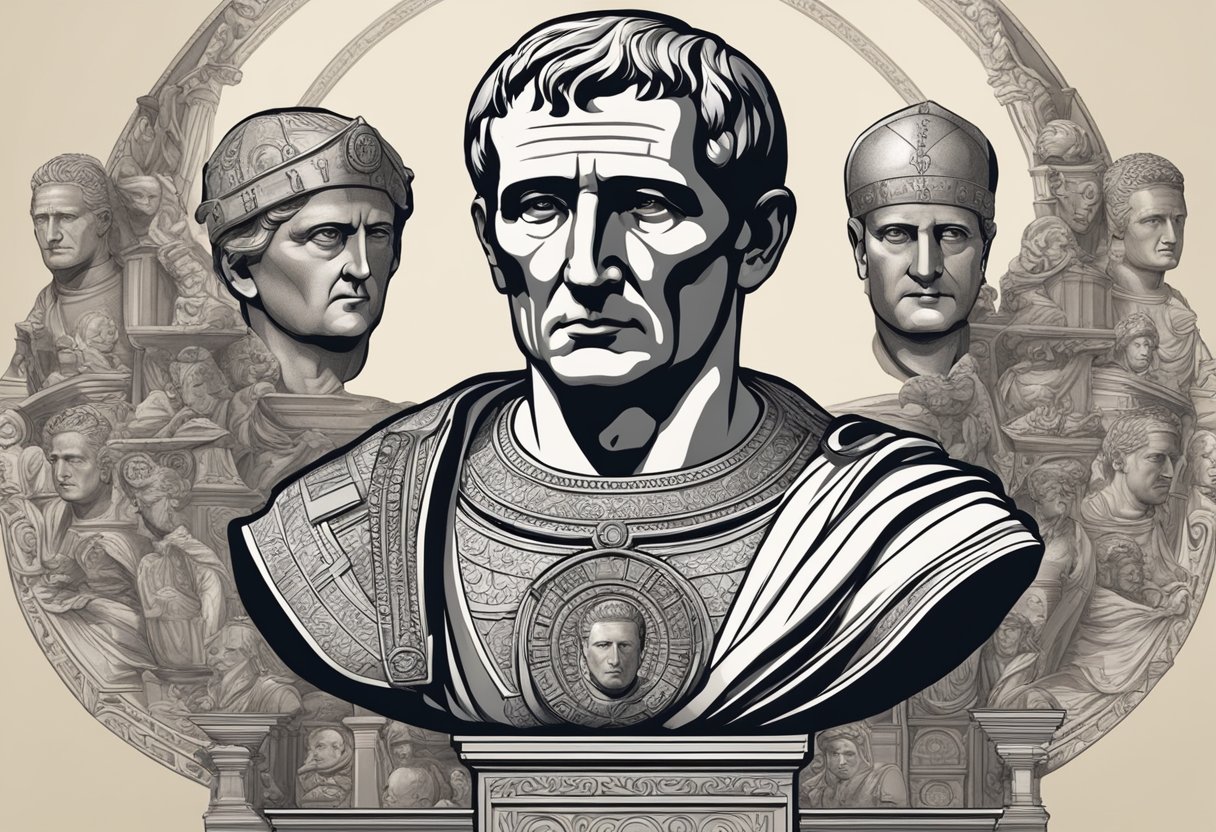
Shakespeare’s Julius Caesar
Shakespeare’s Julius Caesar is a historical drama by the famous playwright William Shakespeare. This play explores the political and personal dynamics surrounding Julius Caesar’s assassination. A key moment in the play is when Caesar is betrayed by his close friend Brutus, resulting in the iconic line, “Et tu, Brute?” This line has become synonymous with betrayal and deceit in popular culture.
Shakespeare’s Julius Caesar is not a direct translation of Caesar’s own writings but rather a dramatization of his life and political intrigue leading up to his assassination. The play’s historicity has been debated by scholars since its publication, but it remains a staple of literary and theatrical depictions of Caesar’s life.
Modern Adaptations
There have been several modern adaptations of Caesar’s life in different mediums. One notable work is the The Landmark Julius Caesar, a comprehensive and accessible edition of Caesar’s commentaries translated by Kurt A. Raaflaub. This work not only covers Caesar’s military campaigns, but it also delves into the rhetorical style and self-representation of the Roman general.
Regarding theatrical adaptations, there are numerous modern interpretations of Shakespeare’s Julius Caesar that portray the political drama in various settings and contexts. These adaptations employ contemporary props, such as daggers, to emphasize the violence at the center of the story. Some even involve gender-bending the characters or updating the dialogue to resonate with present-day audiences.
In conclusion, Julius Caesar’s life has been represented in various forms of art over the years. From the timeless tragedy by William Shakespeare to modern adaptations that bring his story into contemporary times, the life and legacy of Julius Caesar continue to captivate and inspire audiences across different mediums.
Key Battles and Wars
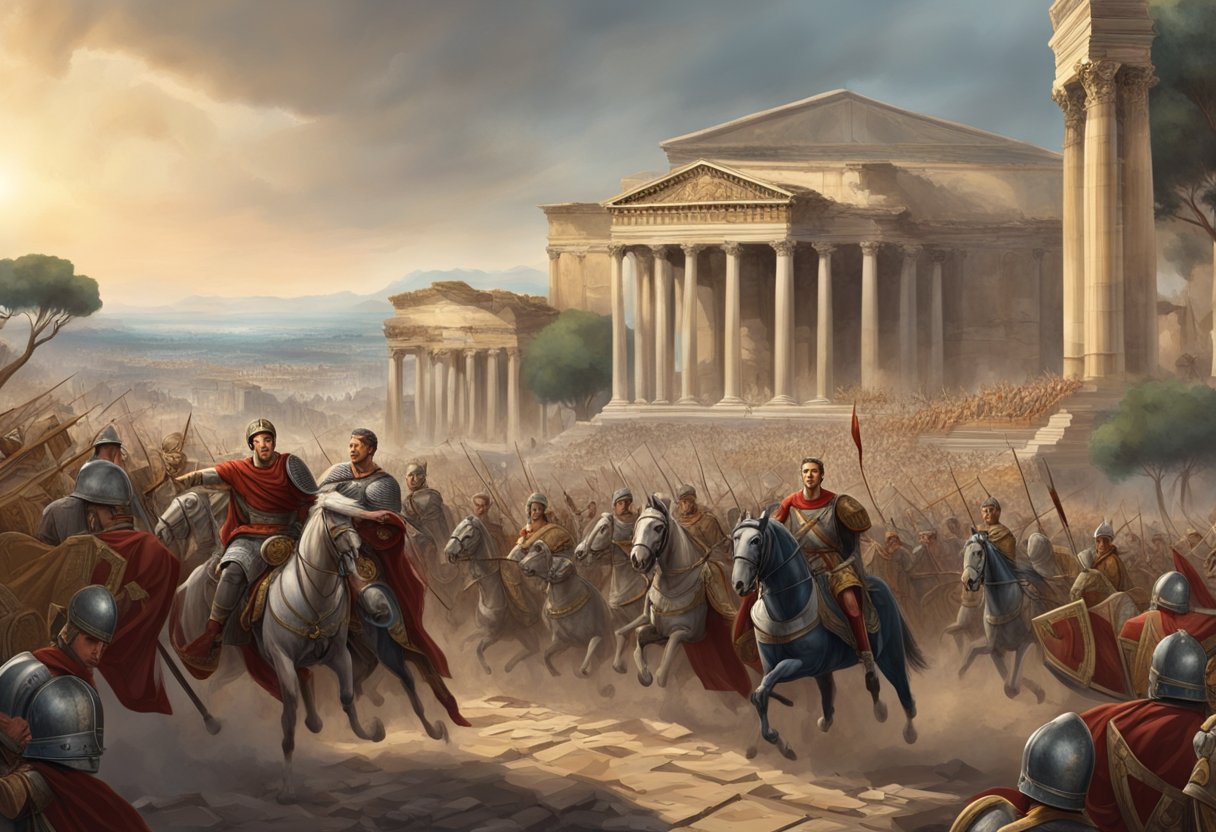
The Gallic Wars
The Gallic Wars (58-50 BCE) were a series of military campaigns led by Julius Caesar against various Gallic tribes in present-day France and Belgium. Caesar’s Commentaries on the Gallic War provide a detailed account of these campaigns, as he sought to establish Roman control over the region. Key battles such as the Battle of Bibracte and the Battle of Alesia showcased Caesar’s military prowess, earning him fame and increasing his influence in Rome.
The Civil Wars
The Roman Civil Wars were a series of armed conflicts between the forces loyal to Julius Caesar and those supporting Pompey the Great and the Roman Senate. The Twelve Caesars by Suetonius gives an overview of Caesar’s life and his involvement in the civil wars. Caesar eventually emerged victorious, leading to the downfall of Pompey and the Roman Republic.
The Alexandrian War
The Alexandrian War (47-46 BCE) took place in the aftermath of the Roman Civil Wars, as Julius Caesar pursued Pompey’s supporters to Egypt. In Alexandria, Caesar became embroiled in a conflict between Cleopatra VII and her brother Ptolemy XIII, eventually siding with Cleopatra. The Assassination of Julius Caesar: A People’s History of Ancient Rome by Michael Parenti discusses the political implications of Caesar’s intervention in Egypt and his relationship with Cleopatra.
The African War
The African War (46-45 BCE) was the final series of battles in the Roman Civil Wars, as Julius Caesar fought against the remaining forces of Pompey’s supporters in Africa, led by Metellus Scipio and King Juba I of Numidia. Caesar’s victory in the Battle of Thapsus marked the end of organized resistance against him and the establishment of Caesar as the undisputed ruler of Rome. Caesar: Life of a Colossus by Adrian Goldsworthy provides an in-depth look at Caesar’s life, including his military campaigns and the African War.
Influence on Roman Governance
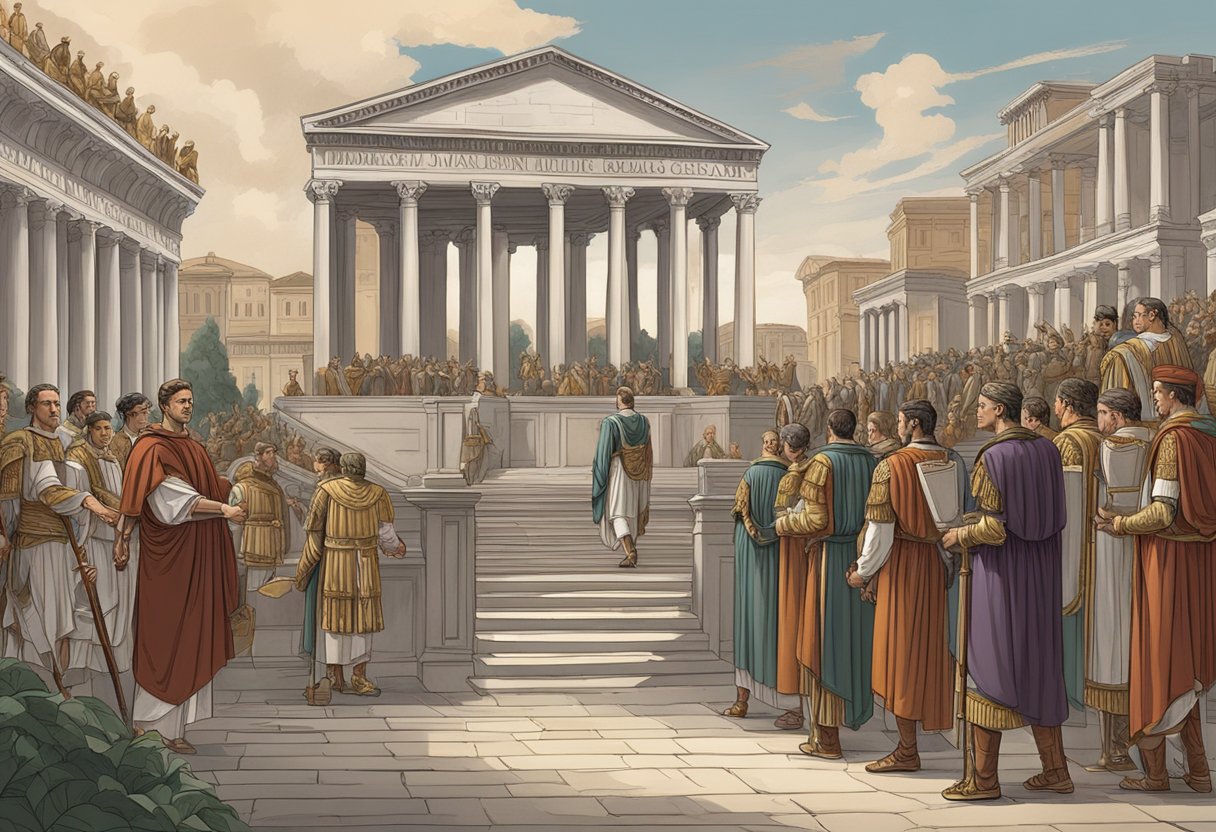
Centralization of Military Command
Julius Caesar played a significant role in centralizing military command in the Roman Republic. He gained immense power through his military triumphs, including the Gallic Wars. Caesar’s centralization of military command enabled him to effectively control vast territories, which in turn bolstered his political power in Rome. His military achievements set the stage for the transition from a Roman Republic to a Roman Empire under his successor Augustus. This transformation would have lasting impacts on the structure and governance of Rome for centuries to come.
Economic Policies
Caesar implemented notable economic policies during his time in power. He introduced financial reforms that helped stabilize Rome’s economy, including the implementation of a new calendar system, the Julian calendar. Additionally, Caesar restructured the Roman tax system, making it more equitable and efficient. He provided debt relief for citizens and implemented land redistribution policies to benefit lower classes.
Moreover, he established a new gold coin, the aureus, which set a standard for currency and trade throughout the empire. This economic stability allowed for the Roman Empire to prosper and grow during the rule of Augustus and subsequent emperors.
Expansion of Senate
Caesar’s rise to power marked a significant turning point in the history of the Roman Senate. In an effort to consolidate power and gain support from various factions, he expanded the Senate by increasing its membership from 300 to 900 senators. This move not only allowed him to exert greater control over the governing body but also diluted the influence of traditional aristocracy.
However, this expansion was met with mixed reactions: while some Rome’s citizens welcomed the diversification of power, others saw it as a threat to the Republic’s foundations. Regardless, Caesar’s actions would have lasting impacts on the Senate and the governance of Rome, paving the way for further transformations under Augustus and establishing the groundwork for the Roman Empire.
In summary, Julius Caesar played an influential role in shaping the Roman Republic’s governance, particularly in areas such as centralization of military command, economic policies, and expansion of the Senate. These reforms and actions greatly impacted Rome’s future trajectory, laying the foundation for the Roman Empire and its governance for centuries to come.
Frequently Asked Questions

What are the most recommended books on Julius Caesar?
There are several highly recommended books on Julius Caesar. Some of the top picks include Rubicon: The Last Years of the Roman Republic by Tom Holland and Julius Caesar by William Shakespeare.
Which authors have written acclaimed books about Julius Caesar?
Acclaimed authors who have written about Julius Caesar include Tom Holland, author of Rubicon: The Last Years of the Roman Republic, and William Shakespeare, who penned the famous tragic play Julius Caesar.
Can you suggest some fiction series that include Julius Caesar as a character?
Although not strictly a series focused on Julius Caesar himself, the Masters of Rome series by Colleen McCullough is a popular historical fiction series that includes Caesar as a prominent character throughout various books in the series.
Are there any highly-rated retellings of Julius Caesar’s life and times?
William Shakespeare’s Julius Caesar is a classic retelling of the life and times of Julius Caesar, although it is a dramatized account and not strictly historically accurate. Another well-regarded portrayal can be found in Tom Holland’s Rubicon: The Last Years of the Roman Republic, which provides a vivid account of the social world of Rome during the transition from republic to empire.
Where can I find in-depth reviews of books focused on Julius Caesar?
In-depth reviews of books about Julius Caesar can be found on various websites, including academic and literary-focused sites such as DailyHistory.org and Goodreads. These platforms often provide user-generated reviews as well as reviews by professional critics.
How accurate are the historical representations in popular books about Julius Caesar?
The accuracy of historical representations in popular books about Julius Caesar can vary depending on the author and their intent. Some books aim for a more fictionalized or dramatized portrayal of events, while others strive for historical accuracy. For example, William Shakespeare’s Julius Caesar is a dramatized account with some deviations from historical records, whereas Tom Holland’s Rubicon: The Last Years of the Roman Republic provides a well-researched account of the era in which Caesar lived. It is essential to verify the author’s intent and any potential biases when assessing the accuracy of historical representations in books about Julius Caesar.
Victoria Cornell helps women adopt a positive mindset even when the struggles of motherhood feel overwhelming. On her sites, Motherhood Life Balance, Neon Moon and Bookworm Era she writes about ways to reduce stress with mindset, manifesting, goal planning, productivity, and more.
